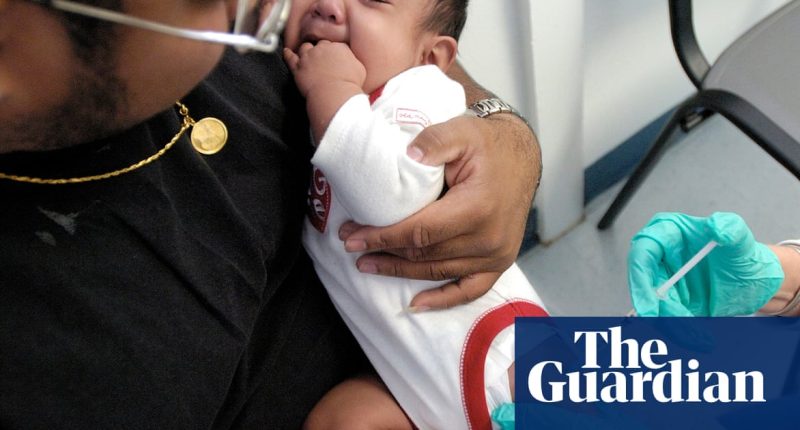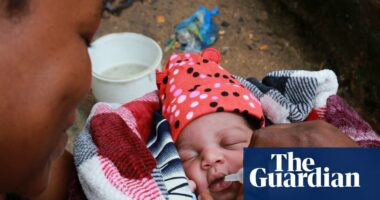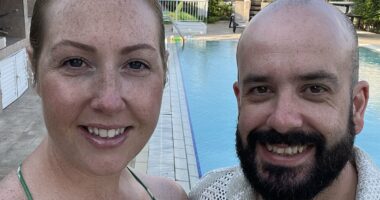Share this @internewscast.com
New vaccines and treatments are linked to a dramatic decline in RSV hospitalizations for babies, according to a new study from the US Centers for Disease Control and Prevention (CDC).
This past winter was the first RSV season with widespread availability of a vaccine given during pregnancy and a monoclonal antibody treatment given in the first eight months of life to prevent RSV (respiratory syncytial virus).
RSV is the leading cause of hospitalization for infants in the US, and newborns under two months are most at risk.
Compared with the RSV seasons from 2018 to 2020, before the Covid pandemic took off, this year’s RSV hospitalizations in babies under the age of seven months dropped by as much as 56%, depending on the data used. In newborns, hospitalizations decreased by as much as 71%.
Heather Auerbach, an emergency physician, noticed that trend, saying: “There was definitely less RSV this year compared to the last two to three years.”
The young children who did get sick enough to go to the emergency room often needed lower levels of care, she said.
“I think I saw fewer critically ill kids from it this year than I have the last couple of years,” she said.
“Even if the kids get sick and even if they wind up in the hospital, there’s a difference between just needing some suction and oxygen versus needing to be on high flow [oxygen] or BiPap or in the PICU or things like that.”
Auerbach wishes her own family could have benefited from the RSV shots, sharing that her son was hospitalized with RSV in January 2020 when he was only three weeks old. He was born full-term with no complications, and then he got sick.
“All of a sudden, his breathing had just gotten much worse,” Auerbach said. He was less alert and started using his stomach muscles to help him breathe – classic signs of respiratory complications with RSV.
Even when infants don’t show these signs, they are still at risk from RSV infection.
“Little babies with RSV can have periods of apnea where they stop breathing, and it can happen suddenly, even if they don’t have other symptoms,” Auerbach said.
Her son was admitted to the hospital, and when he returned home, she and her husband, who is also a physician, needed to suction away mucus regularly.
“I wish the shot had been around then, but we were a few years too early,” Auerbach said. “I genuinely think that could have saved him a hospitalization.”
For parents, a child’s RSV hospitalization can be a wrenching time, full of uncertainty and fear. Hospital stays of any length are disruptive and expensive.
“Kids get very, very sick from this” without vaccines and preventative treatments, and preventing any of that is a major breakthrough, Auerbach said.
She also wonders whether the shots could have prevented, even for a time, additional complications down the road.
Her son started wheezing a few months after his illness. He received an asthma diagnosis, which was “very early and unusual”. Auerbach, her husband and their son’s pulmonologist believe it was related to the RSV infection.
“There’s no guarantee that he may not have ended up with [asthma] regardless. But do I think he would have had it at six months? No,” Auerbach said.
According to one tool for tracking RSV hospitalizations, the CDC’s RSV-Net, the peak in hospitalizations for children under the age of one this year was roughly half of that at the height of the 2023-24 season, and one-third the peak of the 2022-23 season.
Such a dramatic decline only holds for these very young children.
Children aged 1-4 and 5-17 had higher rates of hospitalization from RSV this winter compared with last winter, according to RSV-Net.
“Higher RSV hospitalization rates in older children – who are not eligible for RSV prevention products – suggest this season may have been more severe than previous seasons,” Jasmine Reed, a CDC spokesperson, said.
“Notably, hospitalization rates in babies under three months old were half of previous seasons.”
Typically, more young infants are hospitalized during worse RSV seasons. That hospitalization rates still “dropped markedly” among babies likely means the shots are working well, she said.
It could mean the shots are working even better than the numbers indicate, because the drop in hospitalizations is occurring even amid a more severe season.
These trends track with the new CDC study. Babies under eight months old had a decrease in RSV hospitalizations of 43%, according to RSV-Net, or 28%, according to the New Vaccine Surveillance Network (NVSN).
When the researchers excluded Houston from NVSN data – the city saw an early RSV season before preventatives were widely available – that drop went from 28% to 56%.
The biggest change happened among newborns under the age of two months – the most vulnerable group to RSV infection.
In these very young babies, RSV hospitalization dropped by 52%, according to RSV-Net. The rate dropped by 45%, according to NVSN – but when Houston was excluded, the decrease was 71%.
Older children did not see the same benefit, indicating that the shots are behind the decrease, rather than a change in behavior, testing or transmission rates, the researchers said.
Children older than eight months, who were largely not eligible for the preventatives, were hospitalized at higher rates this winter compared with the same times in 2018–20.
That means the significant drop in young infants’ hospitalizations now could be an underestimate, researchers concluded.
The monoclonal antibody treatment, nirsevimab, may be given to babies under eight months old either at birth, if they are born during RSV season, or as they enter winter. It is given to babies aged eight to 19 months old if they’re at high risk because of medical conditions.
A vaccine for pregnant people, Pfizer’s Abrysvo, is offered in the third trimester during RSV season, which is usually between September and January. Those antibodies offer protection to newborns for several months.
The study shows how high uptake of the vaccines and preventative treatments “can lead to remarkable public health impact in protecting young babies from severe illness”, Reed said.
“Increased use of RSV prevention products during future seasons might lead to even larger reductions in RSV hospitalizations among infants.”











